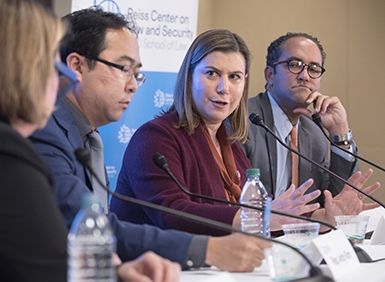Three US Representatives discuss how they use their national security experience in Congress
Before being elected to Congress, US Representatives Will Hurd (TX-23), Elissa Slotkin (MI-08), and Andy Kim (NJ-03) served in the executive branch in the national security sector. They brought both of those perspectives to a conversation on October 11 in Washington, D.C., that was hosted by NYU Law’s Reiss Center on Law and Security. The representatives discussed cultural and organizational differences between the executive and legislative branch, the need for legislation protecting the country against election interference, and the increasing politicization of national security institutions. Lisa Monaco, distinguished senior fellow at the Reiss Center and former Homeland Security advisor to President Obama, moderated the discussion.
Selected remarks:
Andy Kim: “The trade war is a perfect example where Congress has [authority] there that they are just not utilizing, things that we can do to just really try to take back the Congress’s role in being able to deal with tariffs and taxes.”
Elissa Slotkin: “We have not passed any laws that make…our election system—safer in 2020 than we were in 2016. So a group of us came together, a bipartisan group, and started something called Task Force Sentry…to identify the legislation that would be needed to make us safer.…What we could all agree on, regardless of political affiliation, is that foreigners should not play a role in our political process.”
Will Hurd: “What I have seen since my class, the 2014 class…on both the Republican and Democratic side [is that] you have people that have a bias towards action because they’ve had other careers, right? You don’t have people that are professional politicians coming in, and so the newer members are that way, and so when newer members start getting into leadership positions, I think that’s when you’re going to start seeing the body as a whole change. And I also think that structurally, we need people that get reelected for solving problems rather than talking to the edges.”
Follow the full discussion on video.
Posted November 14, 2019


